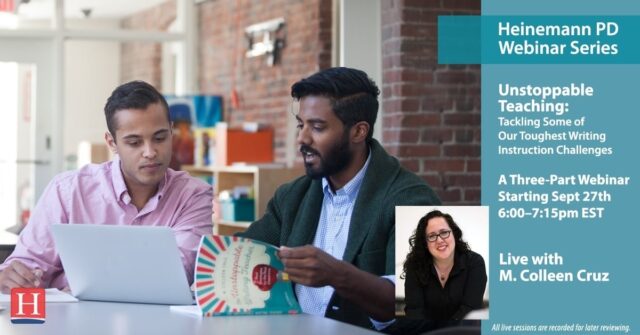
In Teaching Literature In The Context Of Literacy Instruction, coauthors Jocelyn Chadwick and John Grassie explore how the familiar literature we love can be taught in a way that not only engages students but does so within the context of literacy instruction, reflecting the needs of today’s classrooms. They address complex questions secondary English teachers wrangle with daily: Where does literature live within the Common Core’s mandates? How can we embrace informational texts in our literature classrooms? And most importantly, how can we help students recognize how canonical works are relevant to them?
Why Read Dead People?
By Jocelyn Chadwick and John Grassie
[dropcap]A[/dropcap] colleague and dear friend expressed in a note recently that our students never seem to change; rather it is we as English teachers who are changing. I also express this paradigm to teachers: we are constantly in a different space and place because of age, life-events, and perspectives. Consequently, can we afford to consider teaching the texts we love, “know by the back,” as Mark Twain’s Jim says, and can teach in our sleep, so to speak, without taking into account the changes surrounding us and our students as well?
From many of our students’ perspectives, the texts we may love to teach are written by “dead people” and have little, if any, relevance to world our students experience every day. Regardless of their place in the literary Canon, why should they care about these texts, much less be required to read them?
Their query is a good one, indeed, an essential one, for we must have a viable and believable response. One unnegotiable prep on which I have always relied since my tenth graders posed this question to me years ago is to re-read each assigned text before teaching it again. What’s critical about this re-read is that I want to contextualize the re-reading with the students as my audience. From this instructional approach, rigor and relevance are a two-way, shared experience for students and me. The goal in doing so is to establish the relevance and importance of literature as a reflection of students’ concerns and understanding of the world around them.
So how does the “re-reading” approach translate in the classroom?
PD Nugget:
Knowing such recurring re-reading is time consuming, we developed a guide that facilitates this deliberate re-reading, with students as the ever-present focus. Designed as preparatory, this guide also helps teachers construct instructional plans, activities, discussions; allows teachers to “foresee” potential issues students may encounter before the text is assigned. As we used it, teachers asked us if we had any similar ideas for aiding students in their reading of the text, based, of course upon them as the target audience. So, to accompany this guide, we developed a complimentary student-reading guide. Teachers’ and students’ responses and reactions have been keenly illuminating. For additional information, contact Heinemann Professional Development.
Click here to learn more about Teaching Literature In The Context of Literacy Instruction.
♦ ♦ ♦ ♦


Jocelyn A. Chadwick has been an English teacher for over thirty years—beginning at Irving High School in Texas and later moving on to the Harvard Graduate School of Education where she was a professor for nine years and still guest lectures. Dr. Chadwick also serves as a consultant for school districts around the country and assists English departments with curricula to reflect diversity and cross-curricular content. For the past two years, she has served as a consultant for NBC News Education's Common Core Project for Parents, ParentToolkit. In June 2015, Chadwick was elected Vice President for the National Council of Teachers of English.
John Grassie is a veteran broadcast journalist, with more than 25 years’ experience producing news coverage, program series, and documentaries for Public Television, NBC News, and Discovery. During his broadcast career, Grassie’s work received numerous awards for excellence in journalism.


